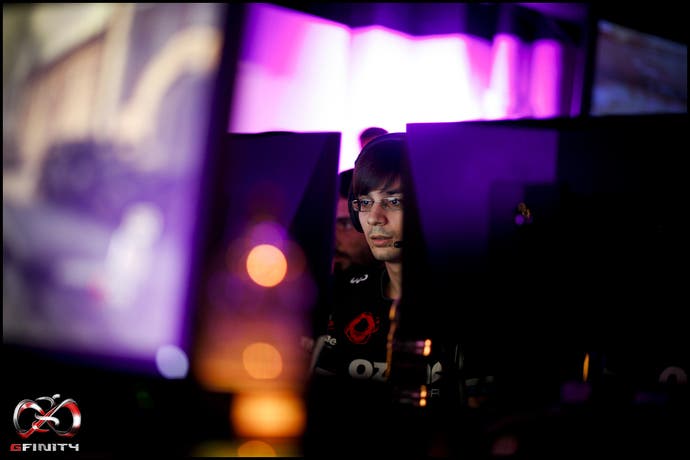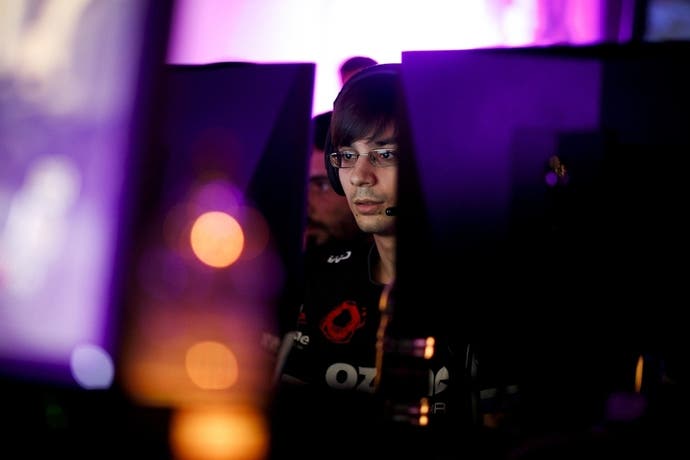How Gfinity wants to establish eSports in the UK
Emerging from the hustle of the competitive scene, there's a new company that wants to make you take eSports seriously.
We're a long way from Georgia. More specifically, we're a long way from those hot sweaty afternoons where Quake players gathered at a tournament for a chance to take the keys to John Carmack's Ferrari 328 GTS back in the late 90s. The stakes are now even higher, the audiences even bigger, and there's a sense of professionalism creeping in.
Paul Kent is a man who's seen the transformation first-hand. "I first got involved in eSports before it was even called eSports, back in about 1996 when it was taking off with Quake, just after the Doom days," Kent tells us. "It wasn't really until QuakeWorld, when Carmack rewrote the first proper network code to allow us to do gaming online and allowed us even ping - so it wasn't just the person closest to the server to win all the games. I took part and played in a lot of the top competitions like QuakeWorld at CES, and took part with some of the biggest teams in Europe."
University soon beckoned, followed by a career at Creative Labs helping design chips for mobile phones and set-top boxes, but eSports remained an interest and a passion. It led to the formation of website WGL, and then Gfinity, the company he runs today. Launched early last year, it's a company founded to establish eSports in the UK, to help boost its reputation as a professional concern and to raise its profile in a territory that's been traditionally cynical towards the discipline. So what makes now the right time for all this to happen?
"I've been involved in eSports for several years, and it's bigger now than it's ever been," says Kent. "The key difference now is not only is it becoming socially acceptable, and known in more non-niche circles, at the same time in the history of gaming we have functional streaming platforms. If you go back to the Quake World days, you needed people who knew about IRC, or about these private websites. We've gone away from all of that - and although eSports is a small percentage of the gaming market, it's easy for anyone to get into it. The transition from a gamer to an eSports player is a lot simpler these days. All these ingredients came at the right time, and it felt like the right time to get involved."
Gfinity's certainly no shaky upstart. It prides itself on its professionalism, and its commitment to its players and its leagues. There's an open-armed nature, too, with a desire to get new players involved, and to educate wider audiences through efforts to inform the spectator. That's the biggest challenge for eSports," says Kent. "How do you manage to let that person at home who's maybe only just getting into it, how do you hook them and get the information to them quickly so they can enjoy what's happening? So far I don't think there's been a perfect answer to that."

Gfinity's answer, in part, is regular programming that educates as well as entertains its audience, and with complementary features that inform newcomers on some of the nuances on more abstract games like Dota 2 and StarCraft 2. While they may be two of the most popular games on the planet, it's harder to communicate the intricacies of a match-up, whereas the activity in a round of Call of Duty, FIFA or CounterStrike - three of the other games that Gfinity supports - is near-universal. "We've put a lot of time and effort into the way we present the games," says Kent. "When we launch our CounterStrike Pro league, we've invested in the type of touchscreen you'd get on Sky Sports. We're building a lot of shows around it. It's just about education."
The open-armed nature is reflected in the teams themselves, and in a culture that's moved far away from the more closed community of old. "Back in the 90s it was more niche than it is now, and along with that came this kind of almost protectionism, and elitism as well. When new people came they were quickly called newbies. There was a distaste for anything new, anything different and anything brash. Really eSports started with Donkey Kong years ago, and as it moved to Doom and to Quake it was a close-knit community. As with anything in life, when people feel they're losing control of something, the majority of humans feel resentment towards that. Although eSports was great back then - I enjoyed it - it wasn't this open, accepting view. Nowadays it seems completely the opposite. Players, teams and organisations are crying out for new people."
There's still one issue, though; the negative perception of eSports, not exactly helped by a video published on this site last year, that the eSports players are a foul-mouthed, juvenile bunch. "Certainly that's there," admits Kent. "It's no different to how a lot of people perceive any type of gamers, not just eSport gamers. It's some rotund person who sits in a dungeon all day, which we both know is not true. Yes, over the last year there has been certain issues with Call of Duty, but from our events - we now run the two biggest Call of Duty events outside of the World Championships, and certainly the two biggest events in Europe - we made an active point of engaging the teams, and saying okay we get this is playing for money, and it's a sport so passions are high and there's intensity there.
"But there's a line, a difference between shouting out encouragement or venting - that's entirely different to sending direct abuse to other people. That's something we clamped down hard on. Certainly our previous two events, we've put a line in the sand, and made it clear to the players that we're here to support the players and turn them into stars, but at the same time if they want to take it to the next level they need to put the effort in as well."
And, in fairness to the Call of Duty players, they're like any young person suddenly thrust into the spotlight in a high-pressure situation. Put a microphone on any football pitch on a Saturday afternoon and the results would hardly be savoury. "I do want to defend the guys, though," says Kent. "I'm not condoning swearing for the point of swearing. Equally I don't think swearing has a part full-stop - but I think some of the press they got was a bit unnecessary. These are a bunch of 18 year olds away from home, a lot of them, for the first time in their lives, and they're playing for a million dollars. Some of these guys will never make that much in their entire life. Sometimes we're too quick to condemn youthful naivete."









